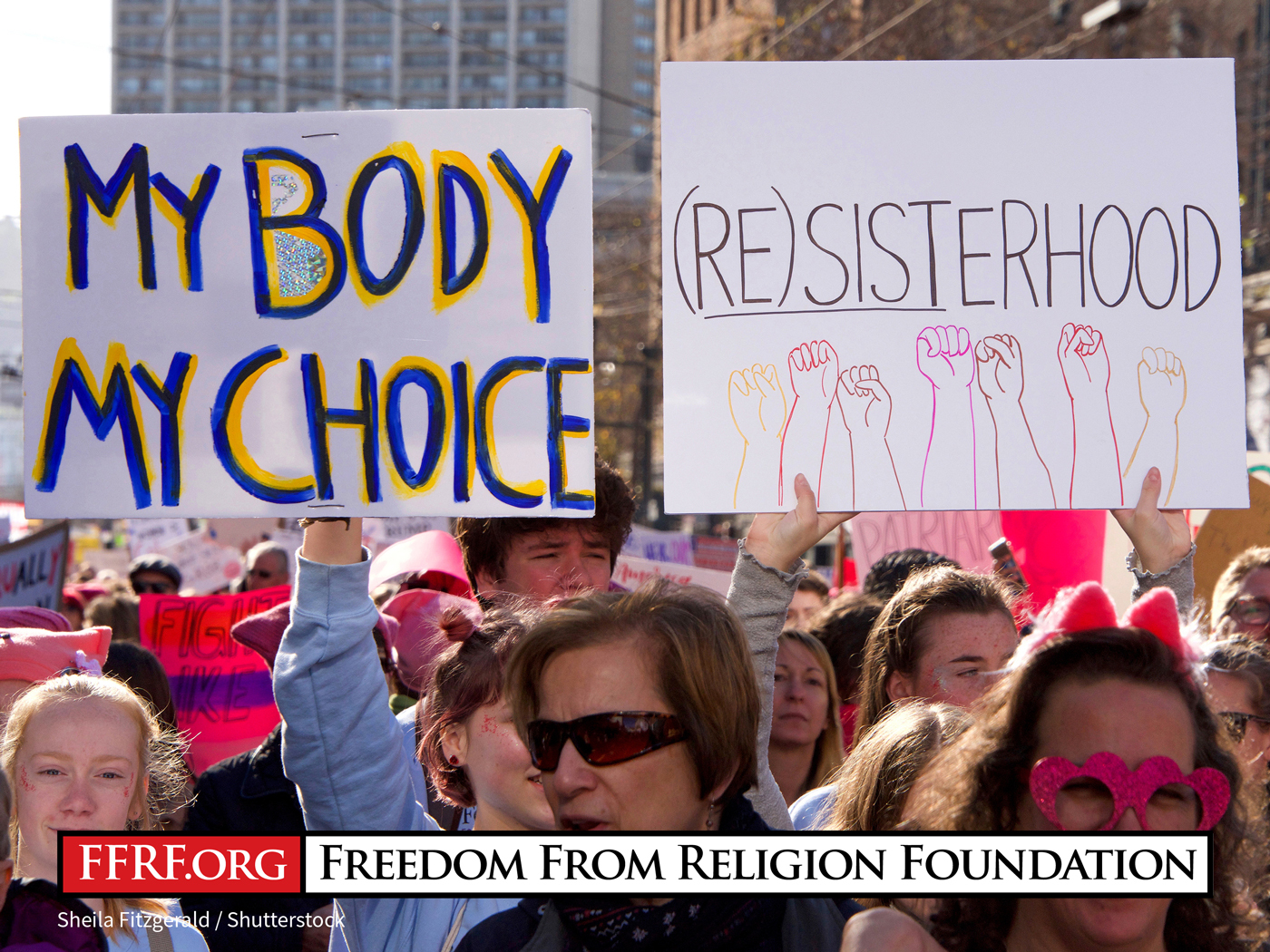
The Freedom From Religion Foundation concurs with the U.S. solicitor general’s powerful remarks before the Supreme Court that the Texas law banning most abortions is a threat to the constitutional rights of all Americans.
U.S. Solicitor General Elizabeth Prelogar noted in her closing argument on Monday, Nov. 1: “Texas’ position is that no one can sue, not the women whose rights are most directly affected, not the providers who have been chilled in being able to provide those women with care, and not the United States in this suit.” If the Texas law is allowed to stand, she said, “no constitutional right is safe.”
FFRF Legal Director Rebecca S. Markert says, “The solicitor general is absolutely correct that every constitutional right we hold dear is threatened if the ultraconservative majority on this court allows the scheme in Texas to stand.”
SB 8, the Texas law, not only restricts abortion after six weeks of gestation, but notoriously deputizes private citizens as abortion bounty hunters who can sue abortion providers and anyone assisting in an abortion to earn up to $10,000. Private citizens, not the government, enforce the ban, with courts, including the 5th U.S. Circuit Court of Appeals, so far failing to block the law.
The Supreme Court heard oral arguments yesterday in two cases challenging the draconian Texas abortion ban, one brought by abortion providers and the other by the Justice Department.
The hearing was a culmination of chaos resulting from the high court’s refusal to block the unconstitutional law on Sept. 1, leading to thousands of women being denied abortion care in Texas, the country’s second-most populous state. The first lawsuit filed by abortion providers in Texas requested that the courts enjoin court clerks and state court judges from docketing SB 8 lawsuits brought by private citizens against abortion providers. The DOJ’s lawsuit argues that the U.S. government should be allowed to sue Texas in order to defend the supremacy of federal constitutional rights, given the extraordinary situation in which a state is thwarting judicial review of a law that deliberately makes constitutionally protected care unavailable.
In three hours of arguments, the justices encouragingly signaled skepticism about the law’s design and seemed inclined to allow at least the abortion providers’ suit to go forward. Justice Elena Kagan dismissed the argument that more than 100 years after a case established how citizens could challenge unconstitutional state laws, the court is now powerless to act. Justice Sonia Sotomayor pointed out the threat to all constitutional rights if states are allowed to replicate this type of law to subvert Supreme Court precedent in other contexts.
“This is not limited to abortion,” she noted, listing a number of Supreme Court decisions that could be subverted if SB 8’s strategy cannot be judicially reviewed. “That’s the point that’s been raised. It’s limited to any law that a state thinks it’s dissatisfied with.”
The law is not only shockingly cruel, but was crafted purposefully to avoid judicial review by making it impossible to identify a defendant who could be sued. Texas Right to Life, a Christian anti-abortion group, was instrumental in drafting this law. Since the conservative 5th Circuit has refused to block the law and the Supreme Court has allowed it to remain in place for more than 60 days, abortion providers have all but halted their services. Many women seeking abortion care must now drive more than 200 miles to surrounding states in hopes of obtaining constitutionally protected reproductive care. Those most impacted by this cruel law are young, low-income, rural, Black, Indigenous, People of Color or undocumented immigrants.
“Abortion is a fundamental right that can only be protected if the principle of separation between state and church is upheld,” says Annie Laurie Gaylor, FFRF co-president. “However, this is not just about abortion, it is about all constitutional rights. This type of scheme could be used to threaten true religious liberty, to ban free speech, marriage equality and any other civil right.”
It is not clear how quickly the high court will rule, but even if lawsuits challenging SB 8 are allowed to continue, reproductive rights are on the chopping block in another case, Dobbs v. Jackson Women’s Health Organization, being argued before the court on Dec. 1.
Please take action to support abortion rights. Call on your senators to support the Women’s Health Protection Act, a federal bill that crucially protects against these abortion restrictions and bans, which has passed the U.S. House of Representatives. Read the testimony the Freedom From Religion Foundation submitted in support of this bill. This is a crucial moment for reproductive rights, and we all must do what we can to safeguard them.

